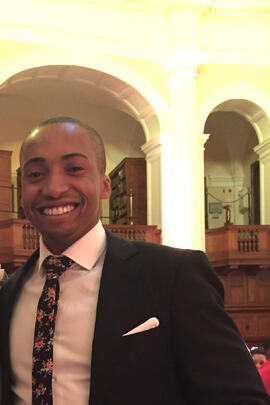Interview with Sabelo Sithebe 2005
- ZA ZAR STDS 202000931
- Item
- 2012
Interview with Sabelo Sithebe – 2005
Sabelo’s mother was determined that Sabelo be a pupil at St David’s and went in everyday to
the admissions department with this objective in mind.
Sabelo remembers his first day at St David’s in the old grade 0 block. He watched Andrew Prior
and Kyle Burger playing cricket, the first time he had seen the game played and joined in. His
teacher was Mrs Tyack and he made life-long friends that day. The head of the prep was Greg
Royce followed by Rick Wilson who built on the merit system which motivated many of the
young prep school boys and changed the mind set of many. He was a father figure who
interacted with the boys well and was always fair. He remembers Mrs Hurley, Mrs Rose who
pushed him with his reading and to achieve, Mrs Geldenhuys whose approach to Maths was
invaluable.
In the high school Paul Edey was headmaster and the teachers he particularly remembers are
Mrs Marais, Mrs Roman, who struck a good balance, being caring and tender but also strong
enough to control a class. Mr Van Den Berg taught him to enjoy Accounting and the atmosphere
he created. Great teachers had good balance and knew which buttons to press at the right time.
Sabelo feels that it’s not the buildings at St David’s but the people who make the school.
The school grew enormously whilst he was a pupil with the building of the Champagnat hall,
high school pavilion and library.
For Sabelo, school was a huge part of his life and he participated in sport in all the three terms
playing tennis, cricket, football, rugby, athletics and swimming. He learnt to swim in grade 6, as
Willy Castle took no excuses and said “you will swim”. Willy Castle was a father figure to all the
boys who were initially afraid and in awe of him. Willy pushed you to be better than yourself and
had a great influence on many of the boys. Sabelo thought the sport was fantastic and the way
in which it helped develop ones character. He was a member of the 1st team football, 1st team
rugby and also did a lot of running. The rugby was tough in the beginning, building bonds,
relationships with fellow soldiers, and believes that’s why rugby is important at a boy’s school,
Sabelo said it wasn’t the same at university, at school every Saturday was special. He recalled
the Johnny Waite victory over schools such as St John’s and learning that even being a small
school they could still achieve a lot.
He felt that there was a lovely balance of academics and sport as school is also about people
development, building young men who participate in society using the Marcellin and Marist
ideals with modesty. Those traditions were instilled in the junior primary with highlights such as
the football tour to East London. The 1st team were in their special kit and everyone played hard
to ensure they upheld the tradition and values of the school. In the high school going to St
Andrews, Bloemfontein was always great.
The camps were sometimes controversial with his grade 9 and 10 year camps being held in
appalling conditions with particularly bad weather. However the grade 11 camp held under the
same conditions went very well. He really hated the camps but really enjoyed that one.
Sabelo participated in the SMILE programme, performed in three school musicals produced by
Mr Dry, and remembers Nelson Mandela coming to watch “West Side Story”. He was also a
member of the school choir in grade 11 and matric.
Sabelo looked up to some of the older boys such as Jason Simaan, Robert Smith, Gareth
Kolkenbeck-Ruh, Bevan Winderly, boys he saw achieving and wanted to emulate them. They
were setting the standard achieving not just for themselves but also for the school.
On becoming head boy, Sabelo knew he would be amongst a group of individuals who would
help him. It was a phenomenal experience and also quite overwhelming being one of a line of
leaders of men such as Mike Von Guilliame, Gareth Kolkenbek-Ruh and Robert Stuart.
Academically Sabelo did very well and was in the top 15 when he matriculated with 7
distinctions. His last day was surreal and emotional and he is very much a product of St David’s.
He went to Wits and studied for a BA Accounting Science until 2009 and then went onto
Investec to write his articles and, having passed the exams, being the first overall in the country
and will start practising as an accountant in November 2012.
JE 2012
Egenrieder, Julie

